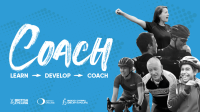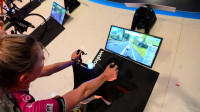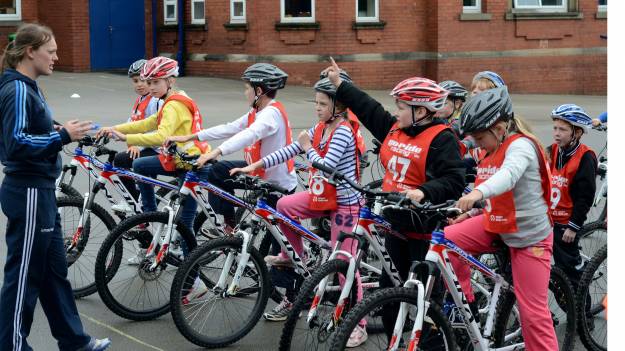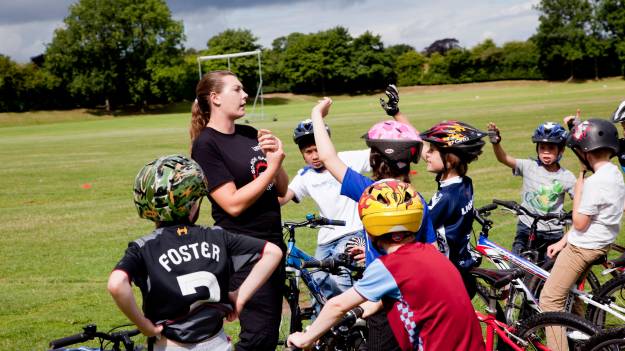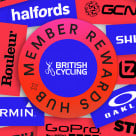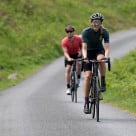Coaching Essential: Planning Coaching Sessions
June 2009
In this month's CPD article we will look at an important part of any coaching session: planning. Many experienced coaches will repeatedly highlight the importance of planning their coaching sessions, yet relatively little time is actually allocated to the planning phase. The planning of a session can take as long as the actually delivery of a session and this time will be increased if any variables are altered. For example if the coach: has a new venue, is new to coaching, is the first session of the season or if they have a new group of riders.
If coaching a group of riders for the first time a coach should gain as much information about the riders as possible as numerous factors can affect the planning and delivery of the session.
How to Collect Information
If you are coaching a group for the first time, it is important that you take some time to collect and analyse relevant information about the riders in order to be adequately informed about them. There are many ways of collecting this information and most coaches will use a number of methods. Some examples are as follows:
- Questions and answers - asking yourself, riders, parents or other coaches specific questions, such as ‘What do you want to achieve from attending the session?'
- Written questions/forms - using a written form, such as a Coaching Consent Form or a pre-participation questionnaire.
- Discussion - a discussion with riders and parents may provide you with additional information that you may not have thought of asking about. Asking other coaches who may know the group you are working with can also provide you with invaluable information.
- Pre-session skills test - this method will provide you with a good understanding of the ability and experience of the riders and has the potential to provide you with more accurate information than a rider self-assessment.
- Outcomes and action points from the review of previous coaching sessions - this information will inform the preparation for, and content of, future sessions.
What information might you collect about the riders
Once you have collected this information you will find that much of it will be relevant and some of it not so relevant. It is the coach's decision to decipher all relevant information for each individual session. For example identifying that you have 5 novice riders in a session will not affect the coach rider ratio, but having 15 novice riders may require an in crease in the number of coaches within the session.
The types of information you may wish to gain prior to the session could include:
- the number of riders attending the session - to ensure the session can be adapted for more or less than anticipated
- the age and gender of the riders - to ensure the plan will be relevant, interesting and safe for the age group
- the level of ability and experience of the riders - to ensure activities that are prepared will suit their skill level, experience and knowledge
- whether the riders have any special or specific requirements - including any special or medical needs
- the riders' motivation for attending the session, their expectations and what they want to achieve from the session
- individual differences - any other differences that may affect the preparation and delivery of the session, such as ethnic composition, preferred learning styles or stage of development
- whether the riders have been to your sessions before - if not, you will need to plan time to explain how you work and any specific rules or guidelines they need to know.
Utilising the information
Once all this information has been gained about the riders you need to look at implementing it into your sessions as each of these factors can affect your Planning of the session of a coaching session. The examples below show how utilising rider information can have a positive affect on your coaching sessions:
- 15 riders expected to attend your session - increasing the number of coach's will ensure if more riders arrive than expected you are not turning them away.
- You have half a group that are 8 yrs old and half that are 14 yrs old- split the group in two so the goals of the session can be changed in order to allow for individual rider development.
- Several of your riders have asthma - ensure this has been identified within your session plan and check they all have their inhalers before the session starts. Inform parents prior to the session that the riders will need to bring their inhalers with them. Riders all want to race MTB - this will enable you to plan each session and group your session specific to MTB.
- You are coaching a group of autistic riders - ascertain from the rider's parents and careers if they have any specific dislikes and behaviour problems. This can be especially important if you have riders who dislike certain colours and sounds, which can act as a trigger for bad behaviour during the session.
- You have 5 new riders in a session of 10 - arrive early and discuss with parents what the sessions entail and leaves extra time to conducts BHC checks
Allocating time to the planning of your session will ensure they run smoothly and effectively. Coach's need to factor this in when coaching and be aware that the planning of a session often requires more time that the delivery itself. For more information on different aspects of planning, please refer to the British Cycling Level 1 Handbook: Introduction to Coaching for more information.
There are also a number of tools, which can help with your planning such as the Risk Assessment Forms for Coaches within the tools and forms section of the website: Coaching Resources

